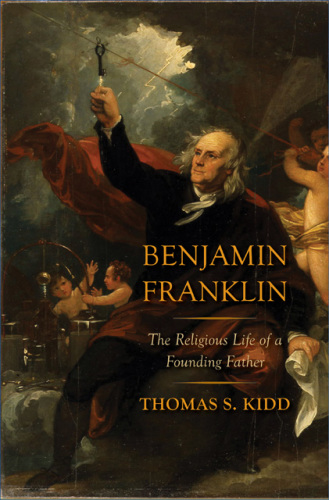
Benjamin Franklin
The Religious Life of a Founding Father
- اطلاعات
- نقد و بررسی
- دیدگاه کاربران
نقد و بررسی

Starred review from April 15, 2017
If the relationship of the Founding Fathers to religion were to be put in Facebook terms, it would be: "It's complicated." This is even truer of Benjamin Franklin's relationship to Christianity. Kidd (history, Baylor Univ.; coauthor, Baptists in America), an evangelical historian trained at the University of Notre Dame, has carefully culled Franklin's (1706-90) works in an attempt to understand his faith. In the end, Kidd finds Franklin's spirituality to be enigmatic. Raised Calvinist, he was close to a number of religious figures over the years and disputed with many more. His was an ethical, rather than dogmatic Christian; he greatly admired the moral teachings of Jesus, but was unsure about his divinity. Kidd presents a man who seriously investigates the claims of his religion and, as a result, offers a fuller portrait of the Founding Fathers, who are too often seen simply as deists. VERDICT Kidd's smoothly written work examines Franklin's religion without losing the objectivity of the historian, adding an important element to the general study found in Walter Isaacson's Benjamin Franklin: An American Life.--Augustine J. Curley, Newark Abbey, NJ
Copyright 2017 Library Journal, LLC Used with permission.

Starred review from March 15, 2017
What did Benjamin Franklin really think of God?Kidd (History and Religious Studies/Baylor Univ.; American Colonial History: Clashing Cultures and Faiths, 2016, etc.) admirably plies the writings of Franklin to discover the Founding Father's evolving views on the divine throughout the course of his long life. Such a book matters because of Franklin's ties to the Enlightenment, his effect on nearly all literate Americans of the mid- to late-18th century, and his life's undeniable imprint on American politics and society. As the author argues, -Franklin...was a pioneer of...doctrineless, moralized Christianity,- This form of the faith was divorced from orthodoxy, steeped in reason, and geared toward the good conduct of moral citizens. Kidd begins his examination with Franklin's childhood; he was raised in a Calvinist/Puritan tradition in which Scripture was at the center of all learning. Franklin's command of the Bible cannot be underestimated, writes the author, and this knowledge came into play not only in his thinking, but also in his writing. As a young adult, Franklin rejected Calvinism and jumped wholeheartedly into the ideas of deism. This period gave rise to some of his most heterodox and eyebrow-raising writings on religion. However, as Franklin aged, his views mellowed. Through exposure to various Christian sects, a lengthy friendship with famed evangelist George Whitefield, and his own leadership role in society, Franklin went on to espouse a skeptical and yet heartfelt form of Christianity focused on good works as the embodiments of one's faith. By the end of his life, it seems certain he believed in an afterlife and in a certain level of providential activity in human affairs. Kidd opens and closes with the image of Franklin calling upon the 1787 Constitutional Convention to open in prayer, asking for God's direction. Unusual for a deist, to say the least. A highly accessible study of an enigmatic yet influential faith life.
COPYRIGHT(2017) Kirkus Reviews, ALL RIGHTS RESERVED.

Starred review from May 1, 2017
Debating the Founding Fathers' faith is a sturdy American indoor sport. So a biography of the most celebrated Founder oriented around his religious opinions should fly off library shelves. And Kidd proffers a very fine book about America's first international celebrity. Drawing on Franklin's many pamphlets and newspaper essays on religion, his correspondence with his most religious close friendshis sister Jane Mecom and the spearhead of the Great Awakening, evangelist George Whitefieldand the remarks of other acquaintances, Kidd argues that Franklin was, from very early on, a deist who believed in benevolent divine Providence. He disliked doctrine, especially the Calvinist predestination in which he was raised, preferring the Christian morality of good works. Having first read the Bible in toto by age five, he had its words at the tip of his tongue; his writing and speech teem with biblical citation and allusion. When he disputed with doctrinaire Christians, he used reason, never deprecation. Of humble heritage, he avoided mounting his high horse. He pioneered a distinctly American kind of religion, Kidd says, a doctrineless, moralized Christianity, in which virtually all beliefs became nonessential and God calls all to do good. Consider this lucid, economical, nonacademic work of scholarship a new cornerstone of Franklin studies.(Reprinted with permission of Booklist, copyright 2017, American Library Association.)




دیدگاه کاربران